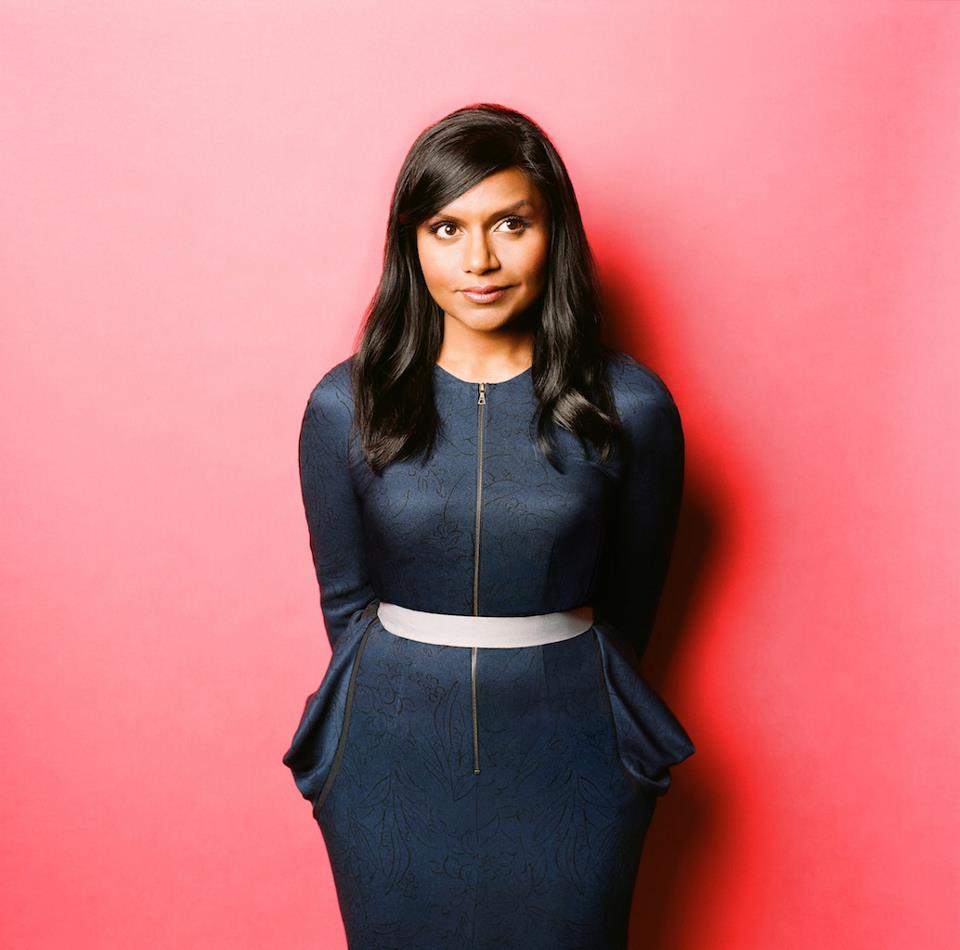Mindy Kaling Crashes Through Broadcast TV’s Glass Ceiling

It is no secret that the entertainment world runs what we see and hear, creating what we think is normal and desirable. Mindy Kaling punches a fat hole through that facade and plays by her owns rules as a self-made comedian, actress, writer, and producer (basically a quadruple threat) without any apologies for being who she is.
Kaling’s career was kickstarted by killing it, both as a writer and actress in her role as her flighty and shallow alter-ego Kelly Kapoor, on the hit show The Office. Kaling has since continued to build her career as a comedian and writer, and is now the writer, producer, and star of The Mindy Project.
In The Mindy Project, Kaling plays a successful OB/GYN, juggling her booming practice, friends, and love life in New York City. She does all this while being absolutely hysterical.
As amazing and hysterical as Mindy Kaling is, it is very unfortunate that people like her on film and television are few and far between. It is no secret that the norm portrayed in most TV and movies are thin, young, white actors, with few leading ladies.
Nothing against the Zooey Deschanels of the world, but the lack of diversity on TV is alarming. The Bunche Center at UCLA does a yearly study entitled “Hollywood’s Diversity Report,” and this year’s statistics are raising eyebrows.
Among cable comedy and drama leads, minorities were underrepresented by a factor greater than 2 to 1 and women by a factor of less than 2 to 1.
Among broadcast comedy and drama leads, minorities were underrepresented by a factor of 7 to 1, while women reached proportionate representation.
Among the creators of broadcast comedies and dramas, minorities were underrepresented by a factor of less than 9 to 1 and women by a factor of 2 to 1.
Among the creators of cable comedies and dramas, minorities were underrepresented by a factor of 5 to 1 and women by a factor greater than 2 to 1.
Based on these findings, your chances of being on TV if you’re a person of color or a woman are slim to none, let alone if you’re both. Actors like Kaling actively challenge these statistics by not only starring in a television show, but also taking the lead in the creative process behind it. Getting producers, studios, and networks to get behind a show created by someone who falls outside of the ‘norm’ in almost every category is quite a feat.
Mindy Kaling is a 35 year old Indian-American and embraces herself as ‘chubby.’ Mindy is unperturbed by her differences and often exudes confidence. Kaling’s tv persona, Mindy Lahiri, is known for loving herself to the point of deliriousness and even unlikability. In response to her unlikeability, she states in her book Is Everyone Hanging Out Without Me (And Other Concerns), “[the] expectation that TV women need to be more likeable than men is bullshit and in need of a change.” Women don’t need to be cutesy or insecure in order to be endearing to get an audience. Women can be completely off-putting but hilarious and still get the job done.
Mindy also acknowledges that her look is far from what TV usually looks for.
In her book, she talks about coming to terms with her body, especially as someone aspiring to be in the entertainment industry. She states,
“[If] someone called me chubby, it would no longer be something that kept me up late at night. Being called fat is not like being called stupid or unfunny, which is the worst thing you could ever say to me. Do I envy Jennifer Hudson for being able to lose all that weight and look smokin’ hot? Of course, yes. Do I sometimes look at Gisele Bundchen and wonder how awesome life would be if I never had to wear Spanx? Duh, of course. That’s kind of the point of Gisele Bundchen. And maybe I will, once or twice, for a very short period of time. But on the list of things I want to do in my lifetime, that’s not near the top. I mean, it’s not near the bottom either. I’d say it’s right above ‘Learn to drive a vespa,’ but several notches below ‘film a chase scene for a movie.’”
Kaling even goes on to state the exact marketability of this kind of variance to the norm.
“A not 100-percent-perfect-looking-in-every-way female? You might as well film a dead squid decaying on a beach somewhere for two hours.”
As such, Kaling breaks the mold of what is considered a “traditional” lead actor.
This kind of diversity is crucial for film and TV, not only for representation, but for the kind of normalcy and true reflection of the reality and the society that exists today. In concord with this, The Bunch Center at UCLA even concludes their study by stating, “[when] media images are rooted primarily in stereotype, inequality is normalized and is more likely to be reinforced over time through our prejudices and practices.”
While it is important to acknowledge Kaling’s difference from what is seen as the TV ‘norm,’ it is crucial to see Kaling for what she is — the norm for so many in society.She is not an outsider to be praised for being different from the rest of us. I think she should be celebrated because she is just like us. Whether its because of her color, size, or general badass attitude, she shows something relatable and actually attainable that isn’t usually shown on mainstream TV.
Even Kaling forgets that she’s not exactly in sync with mainstream media in her recent interview with NPR.
“I often forget that being an Indian-American woman who isn’t sort of pencil-thin — that’s very new to broadcast television.” While she realizes her differences, at the same time, she doesn’t want to be considered the misfit of television as she states, “I refuse to be an outsider, even though I very much look like one to a lot of people.”
Kaling isn’t the traditional leading lady and isn’t trying to be, but that doesn’t mean she doesn’t represent the norm. She isn’t a part of a ‘different’ group, she is a part of society that shouldn’t be split into “us” and “them” categories. When people see relatable characters on screen, it helps them reach acceptance within themselves and society.
Growing up as a young girl of Middle-eastern descent and never once seeing someone of East-Europe/Eurasia not play a stereotype on screen, Mindy Kaling is pretty kickass to me.




